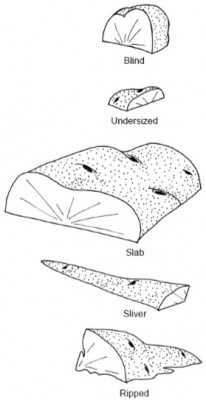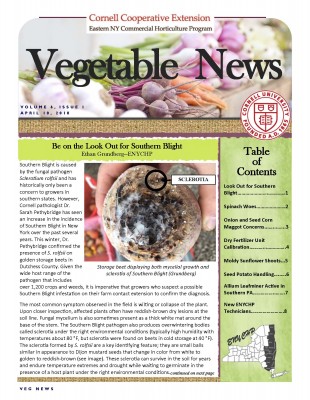Best Practices for Seed Potato Handling
Chuck Bornt, Team Leader, Extension Vegetable Specialist
Eastern New York Commercial Horticulture
I know a few of you have already received your seed potato orders and I think many more will be arriving this week; here are a few thoughts about seed handling and cutting.
First, I understand that when we pay for seed we want to use everyone - but, consider the price of cutting and planting diseased seed? I continue to see more diseases like Silver Scurf (which tends to show up more in storage after harvest) every year. Grade hard and if you see anything that doesn't look right, err on the side of caution and get rid of it.
Cutting seed (information excerpted from University of Maines "Bulletin #2412, Selecting, Cutting and Handling Potato Seed"):
· Disinfect equipment including knives and mechanical cutters before each seed cutting session. Keep knives sharp and straight to prevent ripping the potato surface.
· Warming seed: Potatoes should be warmed to 45—50O Fahrenheit prior to cutting.
· Cut seed tubers into blocky pieces about 1.75 -2.0 ounces in size with at least one eye. Pieces under 1.5 ounces should not be planted. Tubers weighing between 1.5 ounces but under 3.0 ounces should be planted whole. Tubers 3.0—5.0 ounces should be cut into two pieces; 5.0—7.0 ounce tubers should be cut into three pieces.
· Avoid blind pieces (no visible eyes) slab, sliver cuts or ripped pieces as they tend to have less vigor and may result in poor stands.
· Once cut, cool the cut seed to 38 to 40 degrees F and provide good air circulation with relative humidity levels at 85 to 95 percent for 6—10 days to promote healing and prevent dehydration.
· Re-warm seed again for two days before planting to get sprouts growing again and to avoid condensation on the seed.
· Cut potato seed is easily bruised and damaged areas allow decay organisms (on seed or in the soil) to infect the seed piece resulting in slower emergence and less stored energy to promote early growth.
For more information visit the following link to the University of Maine Bulletin 412: https://extension.umaine.edu/p...
 Size of potato piece affects early plant vigor. These are cuts to avoid if possible when cutting potato seed. (source: Bulletin #2412, Selecting, Cutting and Handling Potato Seed, University of Maine)
Size of potato piece affects early plant vigor. These are cuts to avoid if possible when cutting potato seed. (source: Bulletin #2412, Selecting, Cutting and Handling Potato Seed, University of Maine) This article was published in the April 18th 2018 ENYCHP Veg News, to see the full newsletter click: https://rvpadmin.cce.cornell.e...
This article was published in the April 18th 2018 ENYCHP Veg News, to see the full newsletter click: https://rvpadmin.cce.cornell.e...

Upcoming Events
Worker Protection Standards Mock Inspection with the DEC
August 4, 2025 : Worker Protection Standards Mock Inspection with the DEC
Highland, NY
Join ENCHP and DEC staff for a WPS mock inspection. Attendees will split into groups and rotate between multiple stations. 2 core DEC Credits are available for this meeting. This event is free and there is no registration necessary.
2025 Berry Twilight Meetings
July 2, 2025 : Berry Twilight Meeting at Dressel Farms
New Paltz, NY
Join Heather Kase, CCE ENYCHP, and Anna Wallis, Cornell IPM, for seasonal updates on berry pest man-agement and IPM.
July 16, 2025 : Berry Twilight Meeting at Samascott Orchards
Kinderhook, NY
Join Heather Kase, CCE ENYCHP, and Anna Wallis, Cornell IPM, for seasonal updates on berry pest man-agement and IPM.
August 6, 2025 : Berry Twilight Meeting at Fishkill Farms
Hopewell Junction, NY
Join Heather Kase, CCE ENYCHP, and Anna Wallis, Cornell IPM, for seasonal updates on berry pest man-agement and IPM.
Mid Hudson Valley Hard Cider Tour
August 7, 2025
Hopewell Junction, NY
Join the Cornell Hard Cider PWT and visit multiple stops throughout the Mid Hudson Valley Region.












































